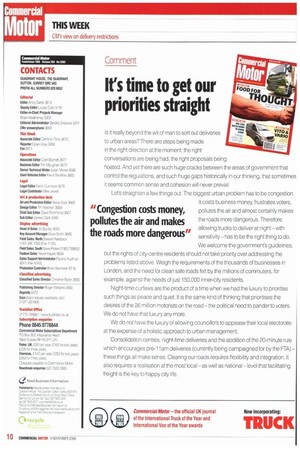Comment
Page 10

If you've noticed an error in this article please click here to report it so we can fix it.
It's time to get our priorities straight
Is it really beyond the wit of man to sort out deliveries to urban areas? There are steps being made in the right direction at the moment: the right conversations are being had, the right proposals being floated. And yet there are such huge cracks between the areas of government that control the regulations, and such huge gaps historically in our thinking, that sometimes it seems common sense and cohesion will never prevail.
Lets straighten a few things out. The biggest urban problem has to be congestion. It costs business money, frustrates voters, pollutes the air and almost certainly makes the roads more dangerous. Therefore allowing trucks to deliver at night with sensitivity has to be the right thing to do. We welcome the government's guidelines, but the rights of city-centre residents should not take priority over addressing the problems listed above. Weigh the requirements of the thousands of businesses in London, and the need for clean safe roads felt by the millions of commuters, for example. against the needs of just 150,000 inner-city residents.
Night-time curfews are the product of a time when we had the luxury to prioritise such things as peace and quiet. It is the same kind of thinking that prioritises the desires of the 26 mill ion motorists on the road the political need to pander to voters. We do not have that luxury any more.
We do not have the luxury of allowing councillors to appease their local electorate at the expense of a holistic approach to urban management.
Consolidation centres, night-time deliveries and the abolition of the 20-minute rule which encourages pre-11 am deliveries (currently being campaigned for by the FTA) these things all make sense. Clearing our roads requires flexibility and integration. It also requires a realisation at the most local as well as national level that facilitating freight is the key to happy city life.
"Congestion costs money, pollutes the air and makes the roads more dangerous"






























































































































































































